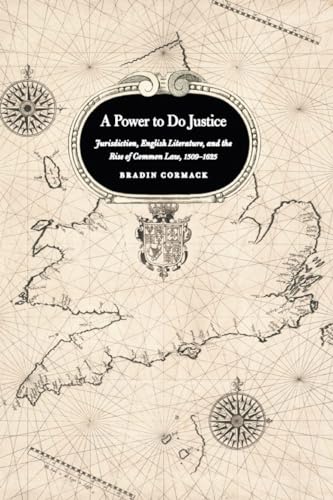A Power to Do Justice
Jurisdiction, English Literature, and the Rise of Common Law
Bradin Cormack
BOOK REVIEW

In a world where justice often feels elusive and literature dances to the rhythm of power, A Power to Do Justice: Jurisdiction, English Literature, and the Rise of Common Law by Bradin Cormack emerges as an essential beacon for those yearning to understand the intricate dance between law and narrative. This book is not just a historical account; it's a passionate exploration that challenges you to grasp the threads connecting law, literature, and society at large. The shadows of our legal past leap off the pages, urging you to question the very foundations on which contemporary justice stands.
From the first sentence, you find yourself pulled deep into the labyrinthine corridors of English history, where the arrival of common law marked a seismic shift in the landscape of governance and creative expression. Cormack deftly weaves a narrative that transcends time, revealing how the evolution of justice is intricately linked to the cultural artifacts of its era. You can almost hear the clinking of quills and the echoing footfalls of authors who shaped this very path-think of giants like Shakespeare and Milton-whose works were inextricably intertwined with the legal constructs of their time.
Cormack takes you on a cerebral journey that extends beyond mere observation. He challenges you to confront uncomfortable truths about jurisdiction and power, urging you to look deeply into how these elements influence literature and vice versa. There's a unique tension and symbiosis here-each work of literature not only reflects societal values but also molds them. Can you feel the pulse of urgency as you grasp the reality that our laws are not merely black and white, but rich tapestries colored by the stories that shaped them?
What resonates with readers is the author's ability to present complex ideas with staggering clarity, coaxing even the casual reader into a state of reflective engagement. The critics have not all been kind, however. Some argue Cormack's academic tone can be overly dense at times, pushing the boundaries of accessibility. Yet, isn't that the beauty of challenging literature? It demands you to wrestle with its nuances, to emerge from the intellectual fray transformed and enlightened.
As you delve further, Cormack puts forth the audacious claim that English literature acts as an agent of legal reform; it's an assertion that ignites fierce debate. Can the evolution of narrative genuinely shift the scales of justice? The paradoxical question lingers like smoke in the air, evoking both skepticism and hope. Cormack wields his arguments like a skilled lawyer, laying down case after case, urging you to consider how literature influences jurors, judges, and the public perception of justice. Every chapter unfolds like a courtroom drama, with the fates of historical figures intertwined with the principles that have dictated our understanding of right and wrong.
Readers have expressed a range of responses, from awe at the scholarly rigor to frustration at the book's demands on their focus. One critic poignantly remarked that to engage with this text is akin to embarking on a high-stakes journey-exhilarating yet demanding. Are you ready to claim your intellectual seat in this courtroom of ideas?
Now, let's not forget the formidable backdrop against which Cormack writes. The rise of common law in England during the medieval period was not just a legal evolution; it marked a revolution in how power itself was conceived and challenged. This historical context is not only fascinating but vital-it forces you to reckon with the realities of a time when justice was a privilege rather than a right.
You cannot ignore the implications of this discourse as it ripples through modern society. Cormack's work provokes a deep introspection of contemporary justice systems that still bear the scars of historical biases. His reflections echo in the ongoing debates surrounding justice reform, social equity, and the role of narrative in a world striving for fairness. The dialogue established in this book is as relevant today as it was in bygone centuries, as new stories emerge that dare to challenge the status quo.
In closing, A Power to Do Justice is more than a scholarly text. It's a clarion call for those who wish to wield language as a weapon against injustice, a reminder that every story holds the power to reshape our understanding of what it means to be just. Take this opportunity to dive into a world where the lines between law and literature blur, and perhaps emerge with a newfound perspective on the power dynamics that govern not just our history, but the very fabric of our society today. Don't let the opportunity to witness this vital intersection pass you by; the narratives of our past await you within these pages, ready to illuminate your path forward.
📖 A Power to Do Justice: Jurisdiction, English Literature, and the Rise of Common Law
✍ by Bradin Cormack
🧾 406 pages
2013
#power #justice #jurisdiction #english #literature #rise #common #bradin #cormack #BradinCormack